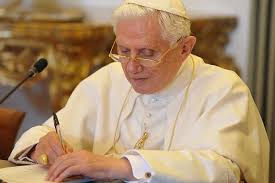SOLEMNITY OF THE SACRED HEART OF JESUS
OPENING OF THE YEAR FOR PRIESTS
ON THE 150th ANNIVERSARY OF THE DEATH
OF SAINT JOHN MARY VIANNEY
HOMILY OF HIS HOLINESS BENEDICT XVI
Saint Peter’s Basilica
Friday, 19 June 2009
Dear Brothers and Sisters,
In a little while we shall sing in the antiphon to the Magnificat: “The Lord has drawn us to his heart—Suscepit nos Dominus in sinum et cor suum”. God’s heart, as the expression of his will, is spoken of twenty-six times in the Old Testament. Before God’s heart men and women stand judged. His heartfelt pain at sins of mankind makes God decide on the flood, but then he is touched by the sight of human weakness and offers his forgiveness. Yet another passage of the Old Testament speaks of God’s heart with absolute clarity: it is in the eleventh chapter of the book of the Prophet Hosea, whose opening lines portray the Lord’s love for Israel at the dawn of its history: “When Israel was a child, I loved him, and out of Egypt I called my son” (Hos 11:1). Israel, however, responds to God’s constant offer of love with indifference and even outright ingratitude. “The more I called them”, the Lord is forced to admit, “the more they went from me” (v. 2). Even so, he never abandons Israel to the power of its enemies, because “my heart”—the the Creator of the universe observes—“recoils within me, my compassion grows warm and tender” (v. 8).
The heart of God burns with compassion! On today’s solemnity of the Sacred Heart of Jesus the Church presents us this mystery for our contemplation: the mystery of the heart of a God who feels compassion and who bestows all his love upon humanity. A mysterious love, which in the texts of the New Testament is revealed to us as God’s boundless and passionate love for mankind. God does not lose heart in the face of ingratitude or rejection by the people he has chosen; rather, with infinite mercy he sends his only-begotten Son into the world to take upon himself the fate of a shattered love, so that by defeating the power of evil and death he could restore to human beings enslaved by sin their dignity as sons and daughters. But this took place at great cost—the only-begotten Son of the Father was sacrificed on the Cross: “Having loved his own who were in the world, he loved them to the end” (cf. Jn 13:1). The symbol of this love which transcends death is his side, pierced by a spear. The Apostle John, an eyewitness, tells us: “one of the soldiers pierced his side with a spear, and at once there came out blood and water” (cf. Jn 19:34).
Dear brothers and sisters, thank you for responding to my invitation and coming in great numbers to this celebration with which we inaugurate the Year for Priests. I greet the Cardinals and Bishops, in particular the Cardinal Prefect and the Secretary of the Congregation for the Clergy, together with the officials of that Congregation and the Bishop of Ars. I greet the priests and seminarians from the various seminaries and colleges in Rome; the men and women religious and all the lay faithful present. In a special way I greet His Beatitude Ignace Youssef Younan, the Patriarch of Antioch of the Syrians, who has come to Rome to meet me and to recognize publicly the “ecclesiastica communio” which I have granted him.
Together let us pause to contemplate the pierced heart of the Crucified One. Just now we heard once again, in the brief reading from Saint Paul’s Letter to the Ephesians, that “God, who is rich in mercy, out of the great love with which he loved us, even when we were dead through our trespasses, made us alive together with Christ… raised us up with him, and made us sit with him in the heavenly places in Christ Jesus” (Eph 2:4-6). To be “in” Jesus Christ is already to be seated in heaven. The very core of Christianity is expressed in the heart of Jesus; in Christ the revolutionary “newness” of the Gospel is completely revealed and given to us: the Love that saves us and even now makes us live in the eternity of God. As the Evangelist John writes: “God so loved the world that he gave his only Son, that whoever believes in him should not perish but have eternal life” (3:16). God’s heart calls to our hearts, inviting us to come out of ourselves, to forsake our human certainties, to trust in him and, by following his example, to make ourselves a gift of unbounded love.
While it is true that Jesus’ invitation to “abide in my love” (cf. Jn 15:9) is addressed to all the baptized, on this feast of the Sacred Heart of Jesus, the day of prayer for the sanctification of priests, this invitation resounds all the more powerfully for us priests. It does so in a special way this evening, at the solemn inauguration of the Year for Priests which I have proclaimed to mark the 150th anniversary of the death of the saintly Curé of Ars. A lovely and touching saying of his, quoted in the Catechism of the Catholic Church, comes immediately to mind: “the priesthood is the love of the heart of Jesus” (n. 1589). How can we fail to be moved when we recall that the gift of our priestly ministry flows directly from this heart? How can we forget that we priests were consecrated to serve, humbly yet authoritatively, the common priesthood of the faithful? Ours is an mission which is indispensable for the Church and for the world, a mission which calls for complete fidelity to Christ and constant union with him. To abide in his love entails constantly striving for holiness, as did Saint John Mary Vianney.
(To continue reading, please see here).











